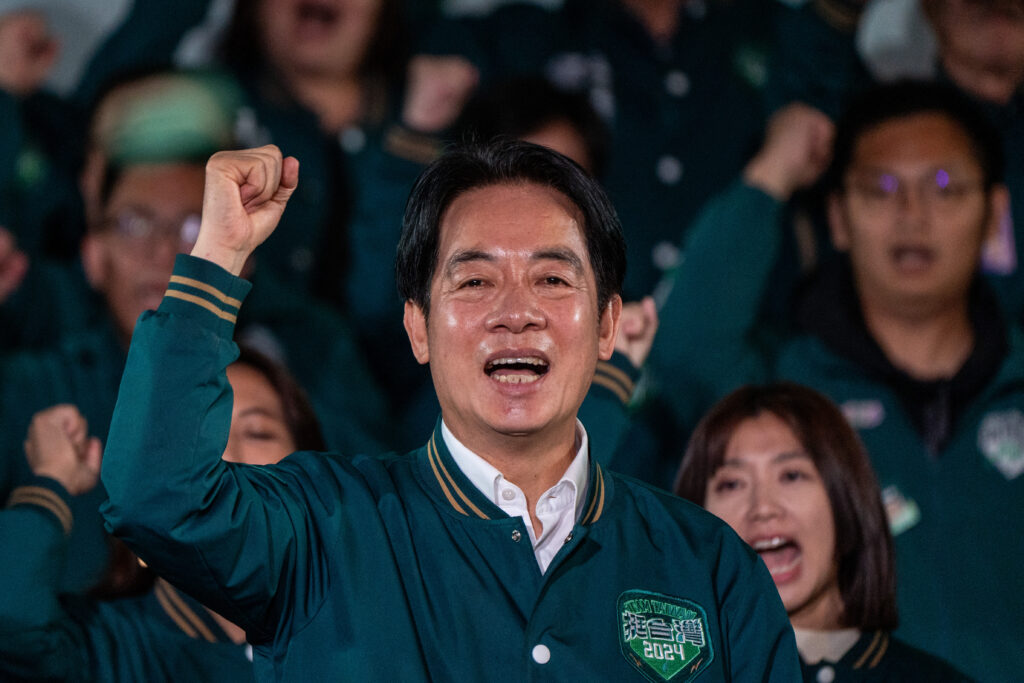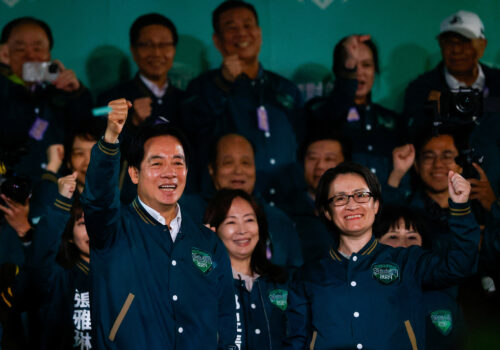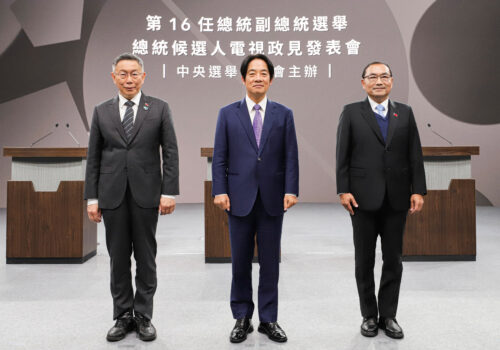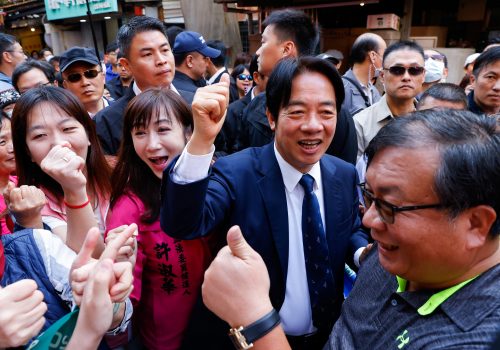JUST IN
The people have spoken—loud enough for Beijing to hear. On Saturday, Lai Ching-te of the ruling Democratic People’s Party (DPP) defeated his two rivals to become Taiwan’s next president over China’s vociferous objections. Meanwhile, the DPP is set to lose its majority in Taiwan’s Legislative Yuan. What do a DPP presidential victory and divided legislature mean for Taiwan’s relations with China and the United States? And how is Beijing likely to respond? From Taipei to Washington, our experts weigh in on the election’s implications.
TODAY’S EXPERT REACTION COURTESY OF
- Wen-Ti Sung (@wentisung): Taipei-based nonresident fellow with the Global China Hub
- Kenton Thibaut (@kentonthibaut): Senior resident China fellow at the Digital Forensic Research Lab
- Hung Tran: Nonresident senior fellow at the GeoEconomics Center and former IMF deputy director
How is China likely to respond?
- Beijing is in no mood to celebrate this democratic exercise in what it considers to be a breakaway province. Wen-Ti predicts that Lai’s victory will be met with rhetorical attacks, economic sanctions, and “an intimidating show of force through military exercises and gray zone security maneuvers.”
- China-based media companies have been attacking Lai and the DPP throughout the presidential campaign, says Kenton, purchasing ads on Facebook to push the narrative that “a vote for Lai would lead Taiwan down the path of war.”
- Now that Lai has won, “we can expect Beijing to enact consequences on Taiwan,” says Kenton. “Economic coercion, increasing tensions in the security sphere, and strategic deployment of the narrative that DPP and US actions are destabilizing the Asia-Pacific region and leading to conflict are sure to follow.”
- After Lai takes office in May, Hung expects Chinese misinformation campaigns to focus specifically on “legislation to authorize money to purchase arms from the United States.”
How will the DPP govern?
- The victorious DPP has indicated it will “double down on US-Taiwan ties,” Wen-Ti tells us. The Biden administration is reportedly sending an unofficial delegation soon.
- But the loss of the DPP’s legislative majority presents challenges for the incoming government, says Wen-Ti. “If it can overcome the constraints imposed by Taiwan’s internally divided government, the next DPP government will be better able to negotiate with Beijing from a position of strength.”
- If the DPP is able to reach across the aisle, Wen-Ti predicts, Lai’s government will “have a better shot at rebuilding a working (albeit cold) relationship” with China and “reopening lines of communication between Beijing and Taipei, which is essential for stabilizing the region.”
- Lai won a plurality, but not a majority of the vote, Hung points out, and the DPP lost its parliamentary majority. This reflects a tension in Taiwan’s politics: “most voters in Taiwan cherish their de facto independence and freedom but want to see an easing of tension with China.”
Could a Chinese response affect the global economy?
- As China considers its next moves, a maritime blockade could be “a less risky, more implementable, and thus preferable option for China” as opposed to an outright attack, Hung points out. “As Taiwan is a vital part of global commerce,” particularly when it comes to semiconductors, even a partial blockade would “add another headwind to the global economy,” he adds.
- That headwind would come on top of a potentially expanding war in the Middle East, among other concerns. Hung notes that the World Bank recently issued a “dismal” estimate of 2.4 percent global growth this year, “completing the weakest first half of a decade since the 1990s.”
- “Taken together, these global geopolitical risks would reinforce the downside risks” that the economy could perform far worse, Hung adds.
Further reading
Sat, Jan 13, 2024
Experts react: Taiwan just elected Lai Ching-te as president despite China’s opposition. What’s next?
New Atlanticist By
Atlantic Council experts explain what a Lai presidency will mean for Taiwan’s foreign policy trajectory—and how China is likely to respond.
Wed, Jan 3, 2024
Why Beijing’s latest pre-election attempt to coerce Taiwanese voters could backfire
New Atlanticist By Lev Nachman, Wen-Ti Sung
China recently said that it would end preferential tariff terms for some Taiwanese chemical exports. But the move may drive some Taiwanese voters away from the direction Beijing wants.
Tue, Dec 19, 2023
What to know about China’s meddling in Taiwan’s upcoming election
New Atlanticist By Lev Nachman, Wen-Ti Sung
China's approach to spreading misinformation to influence Taiwan's upcoming elections has become more subtle and, perhaps, more effective.
Image: Lai Ching-te is waving on stage after being elected the next president of Taiwan during a rally for the Democratic Progressive Party in New Taipei City, Taiwan, on January 13, 2024. (Photo by Vernon Yuen/NurPhoto)



